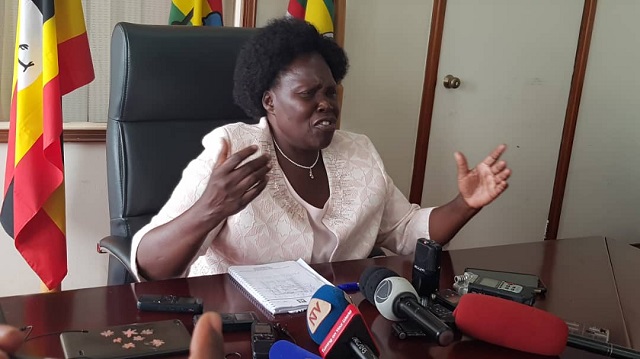
Kampala, Uganda | THE INDEPENDENT | The opposition in Parliament is at loggerheads with the Clerk to Parliament Jane Kibirige for failing to gazette the Constitutional (Amendment) Bill, 2019, drafted by Shadow Attorney General Wilfred Niwagaba.
The Bill seeks to scrap the representation of the army in Parliament, remove the office of Prime Minister, reinstate presidential term limits and prohibit the appointment of Ministers from among Members of Parliament, and others.
It also seeks to provide for the involvement of the Parliamentary Commission in the appointment of the Clerk to Parliament; the involvement of the Judicial Service Commission in the appointment of members of the Electoral Commission, the qualification of the EC Chairperson and the grounds for disqualification of members of the EC.
The Deputy Speaker Jacob Oulanyah, on December 3, directed the Clerk to Parliament to gazette the Bill to enable its First reading on the floor of parliament after Niwagaba failed to obtain a Certificate of Financial Implication for the Bill within the time frame of 60 days stipulated in the Public Finance Management Act.
However, Uganda Radio Network (URN) yesterday learnt that 13 days after issuance of the directive, the Clerk Jane Kibirige has not gazetted the Bill. Instead, she has written back to Deputy Speaker indicating an opinion of the Attorney General about the Bill having financial implications.
On the day she wrote to the Deputy Speaker, Kibirige had reportedly received a letter from the Secretary to Treasury Keith Muhakanizi indicating that the Ministry of Finance could not issue a Certificate for the Bill. Muhakanizi’s letter was in response to an earlier request for the Certificate dated September 18, 2019.
“Your request was analyzed and it was found that the Bill bears financial implications arising from the proposal to increase the number of the members of the Electoral Commission from 6 to 9 and the proposal for the Judicial Service Commission to appoint the members; the proposal to establish a Standing Committee to preside over Parliament in the absence of the Speaker and the Deputy Speaker; and the Proposal to introduce City Land Boards,” Muhakanizi said.
He added that the Bill has been reviewed alongside the 1995 Constitution of the Republic of Uganda and the Public Finance Management Act, 2015 and found to be in contravention of Article 153 of the Constitution since it has financial implications on the Consolidated Fund.
“This necessitated a legal interpretation from the Attorney General before the Certificate of Financial Implications could be issued. Accordingly, the Attorney General has affirmed our observations on the Bill and advised on the possible courses of action,” Muhakanizi wrote.
The outgoing Deputy Attorney General Mwesigwa Rukutana says that the proposed three members to form a Speaker’s Panel may require facilitation out of the Consolidated Fund for their additional duties. He also notes that the same applies to clause 27 of the Bill which proposes to establish City Land Boards saying that currently, government has proposed to establish nine cities which will require the establishment of nine City Land Boards.
Rukutana says that the proposal clearly has financial implication since the members of the City Land Boards will have to be remunerated to perform their duties.
Article 93 of the Constitution prohibits a private member from introducing a Bill that has financial implications. It states that Parliament shall not proceed on a Bill that makes a provision on the imposition of taxation, imposition of a charge on the Consolidated Fund and others.
“I advise that the Government takes over the Bill, and in light of the takeover, the Government establishes the Constitutional Review Commission, which in turn requires a Certificate of Financial Implications, for purposes of drafting a holistic constitutional amendment instead of heaving piecemeal amendments to the Constitution,” Rukutana advised.
He also advises that the Finance Ministry costs the Bill since the financial implications are clearly evident and then a Certificate issued to the Clerk of Parliament.
“The Ministry has indicated that they cannot issue a Certificate of Financial Implication for the Constitutional Amendment Bill, 2019 until the right procedures have been followed as advised by the Attorney General in his opinion… This is therefore to seek your guidance on how to proceed on this matter,” Kibirige then wrote seeking guidance from the Speaker.
But the Leader of Opposition Betty Aol Ocan has also written to Kibirige seeking the implementation of Oulanyah’s directive to gazette the Bill since government failed to act within the time frame prescribed under the law.
“… The purpose of this letter is to ask you to brief the Member moving the Bill and the Opposition Leadership on the implementation of the directive,” reads Ocan’s letter. In an interview with URN, Ocan said that the argument of financial implication holds no merit water after the Deputy Speaker’s directive.
Shadow Attorney-General Wilfred Niwagaba describes the Clerk’s response as a challenge of the Institutions decision. Niwagaba said that they will seek a Court order to compel the Clerk to gazette the Bill, if she fails to comply to the Deputy Speaker’s directive.
******
URN
 The Independent Uganda: You get the Truth we Pay the Price
The Independent Uganda: You get the Truth we Pay the Price



